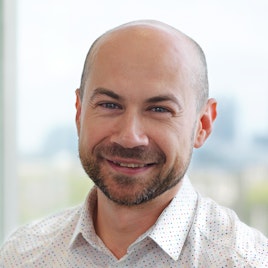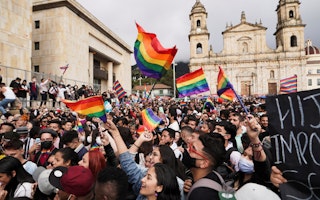LGBTI Rights in Eastern Europe: Between Hope and Despair
By Viorel Ursu & Joanna Hosa
In early June, Vladimir Putin signed a draconian law restricting freedom of assembly in Russia. A wave of international criticism followed. In contrast, laws that effectively ban positive public statements on homosexuality, already adopted in four Russian regions, have attracted far less attention. These laws are just as alarming, especially as national parliaments in Russia and Ukraine are about to adopt similar laws. Six Moldovan localities have likewise prohibited “aggressive propaganda of non-traditional sexual orientations.”
The alleged aim is to protect minors from vaguely defined “propaganda of homosexuality.” This legal ambiguity effectively allows the police to sanction any kind of action. When in April 2012 a prominent LGBT activist Nikolay Alekseyev picketed outside the St Petersburg City Hall with a poster saying ‘homosexuality is not a perversion’, he was stopped by the police and duly fined. Fines for associations and companies can be as high as $15,000 and could ruin any LGBTI organisation.
Fighting discrimination is an ongoing struggle throughout Europe. The International Lesbian, Gay, Bisexual, Trans and Intersex Association (ILGA-Europe) has now published its first Review of the Human Rights Situation of LGBTI People in Europe, which shows just how much remains to be done. At the Review’s launch event, co-hosted by the Open Society Institute-Brussels, the EU Commissioner for Home Affairs Cecilia Malmström noted that homophobia and all kinds of discrimination are on the rise. She added: “The main problem is the lack of people standing up for values in Europe today. There is lack of political leadership.”
The Rainbow Map clearly shows that post-Soviet states rank worst when it comes to legal protection and equality for LGBTI people. It should come as no surprise as these states decriminalised homosexuality only recently. In the Soviet Union homosexual acts were punishable by up to five years in prison. These states now urgently need effective anti-discrimination laws.
Russian activists pin their hopes on strategic litigation. Nikolay Alekseyev has already taken his case to the European Court of Human Rights (ECHR). But will litigation help reverse the laws? Alekseyev previously won a case against Russia in October 2010, when the ECHR found that the repeated ban on gay rights marches in Moscow was unjustified. Despite this ruling, in February 2011 the new mayor Sergei Sobyanin said that “Moscow does not need Gay Pride,” and kept the ban.
Meanwhile, Kyiv was about to host its first Pride in May 2012, but cancelled at the very last moment due to threats of violent disruption by 500 ultra-right counter protesters and hooligans. Sviatoslav Sheremet, the head of the Gay Forum and co-organiser of the Pride, was beaten up just after the press conference where he announced the cancellation. Another organiser of the Pride, Taras Karasiichuk, was attacked again on June 21 and hospitalised with a concussion and broken jaw.
The voice of the people is of little comfort. Recent polls by the All-Russian Center for the Study of Public Opinion (VCIOM) show that 86 percent of Russians support the homosexual propaganda laws, even if only 6% have ever witnessed whatever they understand as “homosexual propaganda.” According to a survey by the Soros Foundation-Moldova, 68 percent of Moldovans believe LGBTI people are “dissolute, immoral, and perverse,” while 56 percent support the idea of punishing homosexual relations.
Public morality is a recurring theme as the Orthodox Church plays a crucial role in the discussion. Moldovan local councils explicitly cite support for the Orthodox Church. Yury Luzkhov, Moscow’s former mayor, infamously stated that the Russian society “has healthy morals and does not accept all these homos.” In Ukraine, some argue that new laws are in fact unnecessary, as it should be clear that homosexual propaganda falls under the already existing law on “protection of public morality.”
All hope is not lost. Previous examples show that profound social change and dissociating religion from homophobia are possible. At ILGA-Europe’s launch event, Heather Grabbe pointed to the incredible progress that Spain has made since it emerged from dictatorship. As shown by the Rainbow Map, this predominantly Catholic country is now one of the best-performing countries when it comes to LGBTI rights.
Poland is another potential success story. Jan Jařab from the UN Office of the High Commissioner for Human Rights wondered if Poland could become a swing state to trigger a domino effect in Eastern Europe. The parallels between the current situation in Russia and in Poland only seven years ago are striking. Warsaw’s mayor Lech Kaczyński banned the Pride in 2004 and 2005, and in 2007 the Minister of Education Roman Giertych drafted a bill banning homosexual propaganda in schools. In the meantime, the Warsaw Pride organisers won their case against Poland at the ECHR and in 2010 Warsaw even hosted Europride, the largest European LGBTI festival. The 2011 parliamentary elections marked a breakthrough. For the first time voters chose an openly homosexual MP as well a transgender MP.
A great deal still remains to be done, but these developments do reflect a profound change in Poland. So, is similar change possible in the post-Soviet countries? External incentives could help. The European Parliament recently passed a resolution on the fight against homophobia in Europe, where it calls on the relevant authorities in Russia, Ukraine and Moldova to reconsider these laws and proposals. However, concrete rewards from the EU are needed to effect change. The Moldovan parliament recently adopted a new antidiscrimination law because it was a condition of the Action Plan on Visa Liberalisation. There is now hope that the visa liberalisation process with Ukraine will also bear fruit.
Can Poland trigger a domino effect? Will the EU incentives work? Incremental change is much more likely than a swift improvement. In order to fight discrimination you need three essential elements: wise leadership, effective laws, and an empowered and vigilant civil society. The combination of these elements will achieve faster progress towards more tolerant societies.

Viorel Ursu is director of advocacy and grant making for the Open Society Eurasia Program.
Joanna Hosa is a former policy intern with the Open Society European Policy Institute.


